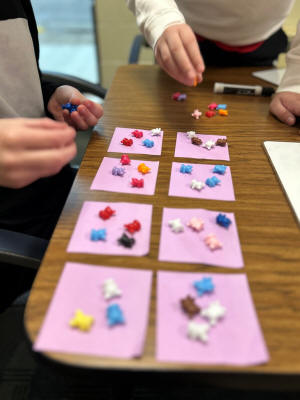|
 Before
joining Chester East, Mrs. Stanley spent ten years in education
working as a middle school math teacher and then as an Instructional
Specialist/Instructional Technology Coach. She also has two young
children at the school and was a Chester East student herself. Her
deep-seated passion lies in nurturing a love for mathematics and a
zeal for learning among students. She believes that instilling these
qualities early on sets students up for lifelong success. Before
joining Chester East, Mrs. Stanley spent ten years in education
working as a middle school math teacher and then as an Instructional
Specialist/Instructional Technology Coach. She also has two young
children at the school and was a Chester East student herself. Her
deep-seated passion lies in nurturing a love for mathematics and a
zeal for learning among students. She believes that instilling these
qualities early on sets students up for lifelong success.
A significant aspect of Mrs. Stanley's approach is changing the
prevailing narrative around math. She aims to challenge the notion
that struggling with math is a standard experience. Her perspective
is that society often accepts and even perpetuates this idea,
leading to a general sense of math anxiety among students. This
issue is not just local but widespread, as evidenced by studies from
the American Psychological Association, which suggest that math
anxiety can begin as early as elementary school and affect about a
quarter of children (
https://www
.apa.org/topics/anxiety/helping-kids-manage-math-anxiety)

To combat this, Mrs. Stanley incorporates a variety
of games and engaging activities into the math interventions. For
younger students, games like "Which is Greater" are a hit, while
older students enjoy a mathematically enhanced version of Go Fish,
where they aim to collect cards that sum up to ten. These games not
only make learning fun but also help students internalize
mathematical concepts in an enjoyable and stress-free environment.

Another cornerstone of the program is the use of the
"Tiny Polka Dots" card deck. This deck is unique in its
representation of numbers from one to ten, displaying each number as
a numeral, in a ten frame, and through various dot arrangements.
Playing with these cards in different game formats allows students
to practice subitizing, the ability to quickly identify the number
of objects in a small group without counting. This is a building
block for number sense and mathematical fluency.
The program also includes a game similar to "Proof," which can be
played using homemade cards or other number cards like Tiny Polka
Dots. In this game, students lay out an array of cards and take
turns to find and prove number sentences (equations). This game is
particularly effective as it can be tailored to different levels,
allowing for a diverse and inclusive learning environment. For
example, one student might spot a simple match, while another might
identify an addition equation or even a more complex two-step
equation.
However, the Math Intervention program at Chester East-Lincoln
School isn't just about fun and games. The activities are
meticulously aligned with the Common Core State Standards for math,
ensuring that they complement and reinforce the topics being covered
in the regular classrooms. These activities are not only designed to
bridge learning gaps but also to provide opportunities for what is
termed a 'productive struggle' in problem-solving.
In small group settings, students frequently review and reinforce
strategies taught by their classroom teachers. Students use a
variety of manipulatives like base ten blocks, beaded number lines,
and hundreds of charts, which provide a tangible connection to the
concepts they are learning. The students are also encouraged to be
active participants in number talks, in explaining and defending
their problem-solving strategies, and even in creating problems for
their peers.

Mrs. Stanley's approach to enriching the math
curriculum extends beyond her immediate role, involving
collaboration with a diverse array of educational professionals. She
places high value on the insights and expertise of the classroom
teachers at Chester East-Lincoln School. These educators are not
only instrumental in delivering the standard curriculum but also
actively contribute to the Math Intervention program by sharing
their resources and knowledge. This collaboration between Mrs.
Stanley's intervention methods and the teachers' dedicated efforts
contributes to a unified and powerful educational journey for the
students.
In addition to the internal resources at Chester East, Mrs. Stanley
and her colleagues benefit greatly from the support provided by the
Regional Office of Education (ROE 17). This institution plays a
pivotal role in the continual development of math education within
the region. By organizing monthly training sessions for teachers,
ROE 17 facilitates the integration of advanced teaching
methodologies and resources into the classroom. These sessions align
to the math curriculum developed by teachers in the area who
understand and buy into an approach that is very hands-on and
meaningful for students. An emphasis is placed on vertical alignment
and differentiated instruction.
[to top of second column] |

The Standards for Mathematical Practice, as detailed
by the Common Core State Standards, foster deep mathematical
understanding and proficiency across all grade levels. These
standards encourage critical skills like problem-solving, reasoning,
and effective communication in mathematics. The full description of
each mathematical practice can be found at
https://www.thecorestandards.org/
Math/Practice/ .
The eight mathematical practices are a primary focus in all math
classrooms at Chester East. One example of how this plays out in
intervention groups is through an activity called "Math Detective,"
where students use their imaginative skills to identify mistakes in
problem-solving. This activity not only helps students to reason
abstractly and quantitatively (Practice #2) but also encourages them
to construct viable arguments and critique the reasoning of others
(Practice #3).

Each grade level focuses on each mathematical
practice in different ways. Kindergarten students, for instance,
work on modeling with numbers (Practice #4), often using bear
figurines to represent mathematical problems. First graders have
made significant progress this year in Practice #5 and are learning
to choose the most effective tools and strategies for different
mathematical scenarios. Second graders have improved their ability
to recognize structures in problems (Practice #7), while third
graders are regularly enhance their problem-solving skills through
discussion (Practice #1). Fourth graders facing more complex
problems are encouraged to develop perseverance in problem-solving
(also Practice #1), and they constantly challenge themselves and
their peers.
Through varied and carefully designed activities, students at
Chester East-Lincoln School are not only developing a strong
foundation in mathematics but are also acquiring crucial skills like
strategic thinking and confidence. These skills are essential for
tackling challenging problems, both within and beyond the classroom.

The administration of Chester East has made math
education a priority, and adding in an intervention program
represents the school's dedication to creating an environment where
mathematics is not only understood but also enjoyed. This program is
shaping confident, competent, and enthusiastic young mathematicians
ready to take on the challenges of the future.
Callie Stanley
Math Interventionist
Chester East Lincoln CCSD #61
Laura Irwin, Administrator
Chester-East Lincoln CCSD #61
 |